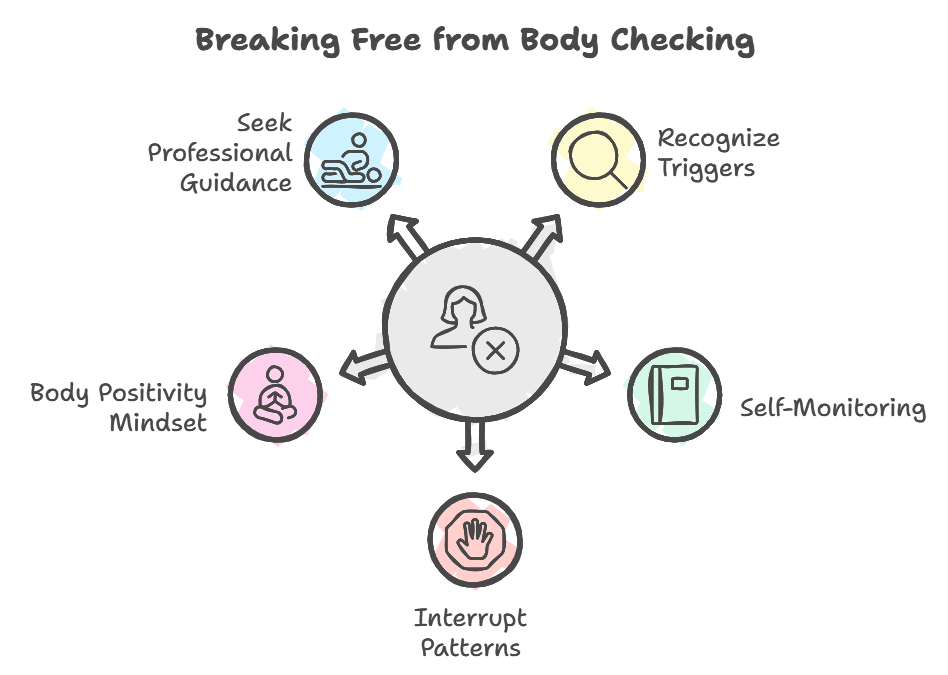Do you obsessively check your reflection? Do you pinch your skin and worry about your thighs? Do you step on the scale several times a day? Do the numbers dictate your mood?
This is body checking. It may seem harmless, but it can become a harmful compulsion. It can devastate your mental and physical health.
This exploration of body checking will help you. It will cover its forms, causes, and how to break free. We’ll uncover the ties to deeper emotional and psychological issues.
We will also see how societal pressures, anxiety, and disordered eating drive this behavior.
What is Body Checking?
Body checking is any behavior to assess your body’s weight, shape, size, or appearance. This might include quick mirror glances, weighing, skin pinching, or checking specific areas.
These compulsive body checks, like size checks, can become a distressing, endless cycle.
Recognizing Compulsive Body Checking
Occasionally checking your appearance before an event is generally normal. However, it becomes problematic when it feels compulsive or disrupts daily life.
Excessive body checking can harm mental health. It may signal a problem. This can lead to a distorted view of your body. You may feel intense negativity about some physical traits.
Women often scrutinize their weight, thighs, or midsection. Men may focus on their muscularity and upper bodies.
Body avoidance, an extreme form, can also be disruptive. Supportive friends can distract you from the urge to check. They can also boost body positivity.
A 2019 study found that, for women, these checking behaviors often increase body dissatisfaction, no matter which body part they examined. This highlights how easily body check can become obsessive and negatively impact self-perception.
The Dangerous Link to Disordered Eating
Research demonstrates a strong correlation between body checking and disordered eating. This problematic behavior can trigger and perpetuate a cycle of negative and distorted thinking about one’s physique.
Compulsive body checking frequently accompanies conditions like bulimia nervosa and anorexia nervosa.
How It Starts
Feeling self-conscious about your body can lead to restrictive eating habits. If you feel this way in social settings, like the office break room, it may be unhealthy.
A 2004 study linked body checks to disordered eating and negative emotions. It highlighted their harmful psychological effects1.
Worries about even small changes in body shape can trigger anxiety. These anxieties might then lead to compensatory behaviors. They include excessive exercise, restrictive eating, and purging, often done in secret.
Body check can change from a way to manage anxiety into a compulsion. Weight concerns, especially among women, can drive compulsive body checking. This sometimes stems from societal pressures or mental health issues.
Body Checking as an Anxious Response
A 2013 study found a strong link between anorexia and body checking. It also linked anorexia to restrictive eating. Body check, especially in those with body dysmorphic disorder (BDD), offers a brief, unhealthy relief from low self-esteem.
Cognitive behavioral therapy (CBT)2 and other behavioral therapies can effectively treat BDD.
This brief relief often comes from social media’s push for perfect bodies. The endless flow of filtered images and tough workouts can harm body image. They can also promote harmful behaviors.
Body checking can soothe these anxieties, but it worsens self-doubt.
A 2018 review and meta-analysis confirmed a link. Excessive body checking (measuring, touching, inspecting, mirror-checking) causes distorted thoughts about appearance. These obsessive-compulsive behaviors contribute to negative emotions and can lead to depression.
The Cycle Perpetuated by Social Media
Experts believe that increased social media use can exacerbate body checking behaviors and contribute to the development of mental health conditions. The pressure to conform to idealized online personas can be incredibly damaging to self-esteem3.
The connection between social media use and impulsive, self-critical thought patterns, such as those linked to body checking, is complex. For more insights into managing impulsive thoughts and ways to improve mental health resilience, you can read this article on impulsive thoughts.
How Social Media Fuels the Fire
Posting selfies often fuels a cycle of seeking validation and focusing on flaws. This lowers self-esteem and harms mental health.
This isn’t just a women’s issue. Both men and women are affected, but their body-checking behaviors may differ.
Social media’s focus on looks breeds constant comparison. This causes body dissatisfaction and a fixation on flaws.
It can trigger or worsen body image issues. It may also cause compulsive body checking as a coping mechanism 4.
“Body checking can create a cycle of negative self-focus. Breaking this habit often requires compassion and a commitment to changing small behaviors over time.”
Dr. Pershing
Curated online profiles often show unrealistic bodies. This can cause feelings of inadequacy and a desire to check one’s body for reassurance.
This can harm those with mental health issues or a tendency to disordered eating.
Breaking Free From Body Checking
Interrupting this self-destructive cycle is crucial. The goal is not to avoid looking at your body entirely, as this can be equally harmful. Instead, aim for a healthy balance and a more neutral perspective on your physical form.
Practical Steps to Reduce Check Body Actions
- Recognize Your Triggers: Identify situations or emotions that prompt body checking. A 2018 study found a link between excessive social media use and body image anxiety. Limit exposure to triggering content or take breaks from social media altogether.
- Self-Monitoring: Track your daily body checking habits. This helps you become aware of how frequent these actions are and how much time they consume. This awareness can be the first step towards change.
- Interrupt the Pattern: When you feel the urge to body check, actively disrupt the behavior. Distract yourself with another activity, engage in mindfulness exercises, or reach out to a friend. Studies from 2013 and 2015 using real-time data show that body checking often intensifies, rather than relieves, anxiety.
- Engage with a Body Positivity Mindset: Focus on appreciating your body for its functionality and strength. Challenge negative thoughts and cultivate self-compassion. Surround yourself with positive influences that promote body acceptance.
- Seek Professional Guidance: If you’re struggling to manage body checking on your own, consider seeking professional help. A therapist can provide personalized strategies and support to overcome this behavior and address any underlying mental health conditions. Cognitive Behavioral Therapy (CBT) is particularly effective.

A 2019 study indicated some benefits of checking behaviors for anxiety disorders, but other research contradicts these findings5.
Some studies suggest that check body actions can worsen eating disorders and other health conditions.
Limiting checking and seeking professional guidance can help individuals dealing with such issues reduce negativity and enhance body satisfaction.
Frequently Asked Questions
What is body check meaning?
Body check is the repeated act of examining body parts for flaws. It offers some reassurance, but it feeds anxiety and a distorted body image.
Even when evidence shows no change or a healthy weight, the behavior persists. It further entrenches a negative self-perception.
Is body checking a form of Obsessive-Compulsive Disorder (OCD)?
Body check is not a distinct form of OCD. But, it has overlapping compulsive patterns. It is often rooted in underlying anxieties. It reinforces negative thinking, impacting mental and emotional responses.
A 2019 study found that excessive body checking raises anxiety. This is true for Body Dysmorphic Disorder, Illness Anxiety Disorder, Panic Disorder, and OCD. This worsens negative mental feedback. It distorts body perception and harms body image.
It worsens existing mood issues, especially in women also experiencing anxiety or depression. Body checking disorder often connects to mental health issues, eating disorders, and restrictive diets.
Excessive body checking can significantly contribute to the distress associated with these conditions.
How to body check someone?
“Body checking someone” can mean two things. It can mean assessing their body. It can also mean supporting someone with compulsive checking behaviors. In the context of disordered behaviors, “checking someone” isn’t appropriate.
Judging someone’s weight, shape, or size can harm them. It can fuel societal pressures and lower their self-esteem. Such actions worsen anxiety. However, “checking on someone” to offer support can be positive.
If you suspect someone is body checking, express concern and offer support.
Encourage them to seek professional help and remind them they are not alone. Focus on positive reinforcement and promoting a healthy body image.
A 2019 study explored gender differences in body checking. It found that men focus on musculature, while women focus on weight and shape. This highlights the societal pressures contributing to these behaviors.
What is body checking on Reddit?
Reddit has become a platform for discussing body checking behaviors. It is a place to share experiences, find support, and learn coping skills.
Discussions cover daily challenges and topics like body neutrality and acceptance.
Online communities can provide support. But, individual experiences vary.
Professional evaluations and personalized care are vital. They are key to addressing body checking and related mental health issues.
Online discussions can raise awareness and provide support. But, they should not replace professional advice.
Conclusion
Body checking is often normalized. But, it is a destructive habit. It stems from deeper issues with self-image and societal pressures.
It’s vital to recognize body checking as a manifestation of these underlying issues. It impacts both men’s health and women’s health negatively.
With proper support and effort, you can overcome body checking. This will improve your mental and physical well-being.
By recognizing triggers, individuals can find lasting recovery. They can do this by monitoring urges, interrupting patterns, and cultivating body neutrality. If needed, they should seek professional help.
It means to stop the harm of body checking. It aims to build a positive self-image and prioritize wellness.
With mindful changes and good strategies, you can find self-acceptance. You can also escape the cycle of body checking.
Small Step, Big Impact
If you find yourself frequently body checking, try starting with small steps—such as limiting time in front of the mirror or practicing self-compassion—to gradually reduce this behavior.
Remember, positive changes take time, and support is available if you need it.
Listen to this article
This is an AI generated Podcast version of the article.
- https://www.researchgate.net/publication/225305162_The_Link_Between_Negative_Emotions_and_Eating_Disorder_Behaviour_in_Patients_with_Anorexia_Nervosa[↩]
- https://www.psychologytools.com/self-help/what-is-cbt[↩]
- https://www.frontiersin.org/journals/public-health/articles/10.3389/fpubh.2024.1324092/full[↩]
- https://pmc.ncbi.nlm.nih.gov/articles/PMC3053001/[↩]
- https://www.sciencedirect.com/science/article/pii/S0887618522001086[↩]



